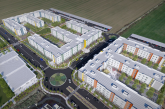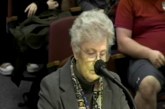
While I do not believe this issue played a major role in the defeat of Nishi 1.0 in 2016, it didn’t help. The project applicant had to commit to not building the project until they gained approval for UC Davis access to the project.
That issue was lying below the surface this time, but given that this project was going to be oriented toward UC Davis students, with primary vehicle access through a connection to Old Davis Road, on the campus, it would necessarily rely on UC Davis granting access via Old Davis Road.
Without prior approval, that figured to, at the very least, be a question that people more skeptical of the project asked.
The irony is that this should be a project that UC Davis should wholeheartedly endorse. After all, they have been under pressure to increase on-campus housing. When they did increase their allotment by 2300 beds to 8500 total, Chancellor Gary May acknowledged that UC Davis cannot solve this problem alone.
He said: “Housing market changes cannot be resolved by UC Davis alone. We want to continue to work cooperatively with the Davis community, City Council and other local communities to encourage 
smart and responsible development drawing on the careful and innovative history of planning in the city of Davis.”
He is correct, but how responsible would it be for the university to want more housing and then leave Nishi hung out to dry?
Buried in the staff report, however, is a huge announcement.
Writes staff: “A major component of the proposal is that vehicle access, with the exception of emergency vehicle and transit access, is via a grade-separated crossing of the Union Pacific Railroad Tracks to Old Davis Road on the UC Davis campus.”
The city has received a draft MOU from UC Davis regarding that access.
Staff notes that campus staff has told them “they are ready to consider the approval steps for the MOU.”
UC Davis representatives will be at this city council meeting to listen to the discussion.
This is a huge announcement that clears away another issue of uncertainty.
As the draft MOU indicates, “UC Davis and City are interested in expanding the availability of student housing which is fairly priced and proximate to the UC Davis campus, and downtown.”
Here are some of the key points:
- The Project will include primary vehicular, bicycle and pedestrian access to and from the UC Davis campus and City transportation grids via a newly constructed undercrossing under the Union Pacific Railroad line. The undercrossing shall be designed to be integrated into the general circulation system of the campus and to accommodate campus transportation services, including double decker buses.
- Nishi will be responsible for the construction, maintenance and operation of the undercrossing improvements, necessary connectivity improvements and to mitigate traffic impacts on campus.
- UC Davis to retain approval authority over proposed improvements to connect the Project to the campus.
- Nishi to fund construction, maintenance (including long term maintenance costs) and operations, of the new Nishi connection improvements.
- University to be appropriately compensated for use of its land.
- To minimize future automobile trips from the Project, UC Davis expects to not allow Nishi residents to purchase commuter parking permits.
- To allow emergency vehicles, Unitrans and Yolobus, but no other motorized vehicles access to and from Olive Drive.
- UC Davis to provide legal access to the campus transportation system to accommodate the Project.
- This MOU represents only the present intentions of the persons signing this MOU and is not intended to constitute a binding agreement between the parties or otherwise create any rights or obligations on the part of either party.
In other words, the MOU is not a binding agreement, but it is a signal of the intentions of the university to support the project with university access.
This is also huge because, in order to even get to this point, a number of high level officials at the university, probably including the chancellor himself, had to sign off on it. Moreover, there were rumors that one reason UC Davis was soft-playing this was because of the air quality concerns. Thus their agreement to allow access to the university implies that there is a general acceptance that this project will not present a health hazard to students.
The project has a long way to go, including a long night ahead for the council. In a lot of ways, it would probably have been easier for all sides had this project come before council back in January.
Nevertheless, the MOU with the university, while not binding, represents an important milestone that there is at least a shared agreement about the need for more student housing and the use of Nishi as a vehicle to bring it forward.
—David M. Greenwald reporting







Really? By the city? (The draft MOU is between UCD and the city.) What, exactly, does this refer to?
By the City? No.
It actually does not say. And again, this is a draft MOU between UCD and the city.
Other points show the responsible party. I’m assuming that this refer to the roadways, through UCD property.
It doesn’t have to say, the developer always pays for things like that, that’s a condition of approval.
“Things like that” are not exactly common. (A private development directly accessing university land.)
Developers don’t pay for “use of city property” for developments in the city. (At least, not in this manner.)
Where’s the agreement between UCD and the developer? And, where’s the agreement between the developer and the city?
You know what an MOU is, right?
There’s a draft of the developer agreement in the staff report.
And, where’s the MOU (memorandum of understanding) that involves digging under the railroad tracks? (By all parties involved with that.)
Actually, there’s nothing to indicate that, either.
Makes me wonder if UCD is making any contribution whatsoever, regarding this proposal to accommodate their growth plans.
Ron, why should UCD be “making any contribution whatsoever”?
It’s their students. And, more specifically, it’s UCD’s pursuit of full-tuition ($42,000), non-resident students that’s responsible for most of the increased need for student housing.
Why should the city pay for this? And, why should the city, other renters, and California resident students be negatively impacted by that decision, especially in the absence of some type of contribution from UCD?
UCD isn’t even in the city.
The city isn’t paying for anything.
That is not clear, at this point.
It is only ‘not clear’ to those who refuse to read.
The Staff Report, including the draft development agreement, is posted on the City’s website Ron. Enjoy.
Mark: I provided one example above, where it is absolutely not clear. (And, this only relates to one-time costs, not the long-term costs.)
Seems like you’re the one who “refuses to read”.
As a side note, you really should learn to communicate in a more polite and respectful manner, with those you don’t agree with.
UCD is not a parent. UCD is not a charity. It is a public “business” established for a common good. A Public Entity. As such, they cannot, and should not, make a gift of public funds. For what is basically a private enterprise. Same for the City.
Legal responsibility? No! Moral responsibility? Only to the extent they choose to make it so… public entity “morals” can be problematic, unless the “public” is much behind it.
As regards the improvements envisioned in the draft document(s), the City is not… wrong again… for the same reasons why UCD should not/cannot.
Facts.
Not attacking you… just some of your assertions,and PA questions…
It’s ridiculous that UCD’s providing education to students has been turned into a negative.
Providing education is not a “negative”. Foisting costs and impacts upon an unwilling city, while collecting $42,000 in tuition from each non-resident student is another matter. (While simultaneously disadvantaging California residents, regarding both enrollments and places to live.)
Do I need to repost the articles regarding state audits (describing UC’s enrollment practices), again? Or, the articles regarding interference with state audits?
Or, the references to the agreements that other cities have made with UCs (regarding offsetting impacts)?
David
“It’s ridiculous that UCD’s providing education to students has been turned into a negative.”
But not ridiculous to query their decision making in prioritizing the admission of out of state or country students to the detriment of qualified locals in order to obtain the higher tuition.
Especially when California residents are paying taxes to support the UC system. I think UC should have a responsibility to take care of all CA students first before looking out of state or country.
Your point, Tia, is generic to CA… altho’ it has a Davis part as well.
It also is pertinent to tuition and policies, but somewhat off-topic.
I agree that any additional out-of-state, should not come at the expense of in-state, if that is your point…
Know of a number of folk, coming to CA from elsewhere, working for menial jobs for a year or two, to establish CA residency (then, qualifying for in-state tuition)… old trick… goes back 50 + years… same at other state universities, across the country… know it is also true in CO…
David, I surely didn’t say/imply, ” that UCD’s providing education to students has been turned into a negative”… reread where I opined that UC is a business, for a public purpose… nothing negative in that!
After all, the City of Davis is a Municipal Corporation… i.e., a business. Established for the public weal…
Perhaps you inserted at an unintended level?
It wasn’t in reference to you
Some people tend to take everything personal.
At the VERY least, sure. But then why have 700 parking spaces when that land could be used for at minimum a thicker trees and shrubs barrier? (It would be at least 250 ft. from the northernmost traffic lane.) A perhaps better alternative is a commercial development with limited satellite parking focused on I-80 access and significant greenery that – in addition to allowing further subsidy for low-income housing – blocks air and perhaps a significant amount of noise pollution?
With all those cars – a reduction from earlier plans but still an average of one per apartment unit – many trips off-site and off-campus will still happen by car as it’s unlikely that the possible on-site market will be able to match e.g. Trader Joe’s in selection (and price). The City of Davis has goals for bicycle modal share and its doing most poorly at shopping trips by bike. The development team for Nishi seemed to go for the electric cargo bike share idea I suggested when the Bicycling, Transportation and Street Safety Commission reviewed Nishi again in December, but they’re not going to be used much when there’s so many cars at home and free parking on the other end of the trip.
The project can be healthier and more profitable with almost no private car parking onsite.
(To be clear, I think that air quality at Nishi is still an open question. Minds are not closed but it’s also not clear if the windows will need to be, if just to protect against the ambient pollution in the general region that frequently exceeds Federal standards.)
This is amazing. This is an entirely positive development. It means that the project can go forward with traffic directed almost entirely through campus, eliminating the issue of traffic increase on Richards Blvd. It means the university is willing to cooperate fully to help provide more student housing right adjacent to campus.
And yet we just get this repetition of all the same negative talking points, right up to and including the completely irrelevant issue of whether students coming to Davis are residents or non-residents.
Well, in this case, the thread started out by noting that the requirement stating the “University to be appropriately compensated for use of its land”. Still not even sure what that means.
The broader issue remains relevant (foisting costs and impacts upon the city, related to UCD’s pursuit of non-resident students).
And, you absolutely cannot conclude at this point that “the project can go forward with traffic directed almost entirely through campus”. That is an entirely premature conclusion.
What you have is a draft MOU from UCD (which isn’t even fully explained, or agreed upon), and that’s it.
Is there a link to the actual draft MOU, so that we don’t have to rely upon the Vanguard to highlight “key points”, as described in the article above?
Below is a link to the actual, draft MOU. (Probably one of the first things I’d include, if I wrote an article).
http://cityofdavis.org/home/showdocument?id=8906
Given the city’s “wavering requirements”, I find #15 pretty amusing: “For the project to comply with all applicable affordable housing requirements of the City”.
And actually, I can’t tell which party initiated the draft MOU. (The developer?) Nor do I see any signatures/approvals. Actually, David simply noted that UCD “appears” to be ready to sign off on it.
Time to put Nishi on the ballot… up or down… 4 months (or more for the minor ones) to sort out details. No more delaying nonsense.
I couldn’t disagree more Howard. Putting it on the November ballot is an infinitely superior choice.
Tuesday night Council will be making two decisions
Because the current budget can’t be balanced with 100% of General Fund revenues covering expenses, Council is asking the voters to approve two parcel taxes that the Staff Report describes as follows, “Based on the Leland long-term forecast the two parcel taxes generate an annual average of $4.6M in new revenue.” Approval of those taxes will increase General Fund revenues from 100% of current to more than 107% of current.
The updated New Development that Staff presented to the FBC uses a baseline of 75% of current General Fund Expenses (in the City’s Budget annual Expenses = annual Revenues), and at that 75% level Staff “estimate(s) that annual ongoing revenues and costs for the city from the project would be modestly net positive over time.”
My question to you and the members of City Council and to the voters is why the current taxpayers of Davis are being held to a 107% standard at the same time the Nishi project is only being held to a 75% standard. Shouldn’t Nishi be responsible for the same 107% burden as taxpayers like you are responsible for?